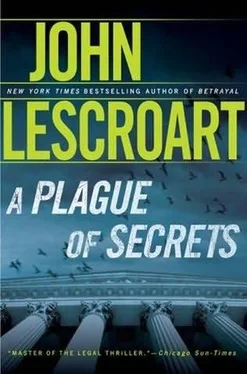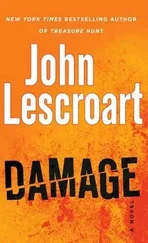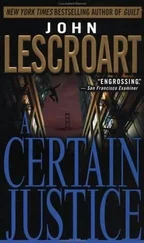Hardy pulled the fallen wooden chair upright and sat on it. “I’m listening, but I hope you’re not going to tell me you’re quitting, because Glitsky just told me he’s quitting and if you both quit on the same day, I’ll start to feel like all my friends are old, which would mean I’m old, and that would be depressing.”
Farrell’s head came up. “Glitsky’s quitting?”
“Maybe not,” Hardy said. “I might have talked him out of it. He probably didn’t even mean it. He’s having a bad time.”
“Maybe we should start a club.”
“You don’t want to be in his club. His kid’s in the hospital with a head injury.”
“Shit. How bad?”
“Bad enough, but alive at least. For now.” Hardy let out his own sigh, met his partner’s gaze. “So. What do you want to talk about?”
Farrell came forward, elbows on his knees, his hands linked tightly in front. “There’s this coffee place out near my house,” he said. “Bay Beans West, maybe you read about it this weekend. The manager, this guy named Dylan Vogler, got himself shot on Saturday. Sam, in fact, discovered the body. Well, I just got a call on my cell from Debra Schiff, you know her?”
“Sure.” Hardy nodded. “Homicide. Why’d she call you?”
Farrell hung his head for a minute. “Because Vogler sold weed out of the shop, and he evidently kept a list of his regular clients on his computer at home.” He raised his tortured eyes. “It’s gonna get out, Diz. Hell, it’s probably already out. What I’m wondering is if you think it would be better for the good of the firm if I resigned.”
Schiff couldn’t let goof what she felt was Maya Townshend’s crucial slip of the tongue: “There’s no real reason to keep the place.” Although admittedly slim pickins, she felt it was worth pursuing. Bracco and she agreed, however, that they could do their fishing elsewhere first, before coming back if necessary and taking on Maya head-to-head.
To this end, in the midafternoon, maybe ten other people in the shop, they were sitting up near the bakery products area of BBW with Eugenio Ruiz, who’d been one of the assistant managers under Vogler, and who’d opened the place this Tuesday morning and was currently functioning as the manager.
Eugenio was in his early twenties, small, wiry, and highly strung. He wore his thick black hair in a ponytail and had a couple of days of dark beard growth covering the acne scars. Today he was wearing black slacks, sandals, an incongruous button-down pink shirt, and a vest that looked like it came from South America. A diamond sparkled in his right earlobe. Though not handsome-not with the prominent and crooked nose and the gold-crowned front tooth-he had a confidence and a straightforward warmth that Schiff thought gave him some appeal.
She must unintentionally have been conveying that fact somehow, because even though she had at least ten years on him, he was definitely hitting on her. “She’s okay,” he was saying of his boss Maya Townshend, “nice enough, but not as pretty, say, as you.”
Schiff did her best to ignore not just the comment but Bracco’s quick smirk. “But you haven’t really talked to her that often?” she asked.
“No. The longest conversation I had with her ever, really, was yesterday when she asked me if I would take over the place for a while until she could get a new manager. I told her I wanted to be the first to formally apply, and she said she appreciated that, she’d keep it in mind.”
“So she’s planning to keep the place open?” Bracco asked.
“I hope so. I haven’t heard not. Why? Have you?”
But Schiff the cop was there to ask questions, not answer them. “How would you characterize Mrs. Townshend’s relationship with Dylan?”
“What do you mean?”
“I mean, how did they act together? Like friends? Or more like boss and employee?”
Eugenio scratched at the corner of his mouth, a smile playing around his lips. “Boss and employee, but maybe not the way you think.”
“We don’t think any way,” Bracco said. “That’s why we’re asking you.”
Schiff shot her partner an unappreciative glance and came back at the witness, softening the rebuke. “What are you trying to say, Eugenio?”
“Well, just that if you didn’t know and you saw them together, you wouldn’t think she was the boss.”
“You’d think he was?”
“Most people, I think, yeah.” A quick shrug. “When I started here, the first time I see her come in, she’s back in the office, doing some books or something and it’s cooking out here-I mean, we got a line out the door and everybody’s in high gear. So she comes to the office door and calls for Dylan and he’s taking the orders and doing his schtick and he just waves her off, he doesn’t have time. Makes a joke about accountants when we’re the actual bean counters-get it, coffee beans…”
“I get it,” Schiff replied deadpan.
“Yeah, so, anyway, the whole time she’s back there and then finally she just finishes up and leaves without saying anything to anybody else. And when it finally slows down, I ask, ‘So who was that, our accountant?’ and Dylan about busts a gut laughing. ‘That,’ he says, ‘is the owner. But I,’ he says in that Godfather voice he could do, ‘I’m the boss and don’t you forget it.’ But not really serious. That was the way he talked, that was all. He could be funny when he turned it on.”
“So he was a good boss?”
“Definitely.”
“Did you know he was selling marijuana out of here?”
Ruiz quickly looked from Schiff to Bracco and back. “Nope,” he said. “No clue.”
“Did you ever buy any from him?” Bracco asked.
“No way, man. I don’t do drugs.” A smile at Schiff. “Except caffeine, of course.”
Since Ruiz’s name did not appear in Vogler’s computer, Schiff was willing to let this answer pass. It might even be true. “Let’s get back to Dylan and Mrs. Townshend, if we can, all right? Did he always treat her as though he was the boss, and not vice versa?”
“Pretty much.”
“And she took it… how?”
“I think mostly… I mean, I don’t know for sure… but if you ask me, it’s why she didn’t come in too often. She was nervous, like. I don’t think they really liked each other.”
Schiff told him that Maya had told them she and Dylan had gotten along.
His eyes went to both inspectors in turn. “Well, I don’t want to get her in trouble. She seems like a nice enough lady. Maybe they saw each other out of work.”
“No,” Bracco said. “But she did tell us that with Dylan dead, now there was no reason for her to keep the shop open. You have any idea what she meant by that?”
The young man shook his head. “She didn’t tell me she was going to close it up. I don’t know why she’d do that. The business is great. That just doesn’t make any sense.”
In the passenger seat of their car just after the interview with Eugenio Ruiz, Bracco hung up his cell phone. “Well, that’s interesting.”
“What?”
“Guess who’s the registered owner of our purported murder weapon? I’ll give you a hint. By all accounts she’s not quite as pretty as some men find you.”
“You caught that, huh?”
“I’m a trained detective. Nothing escapes.”
“You want to go by again and say hello?”
“I was thinking maybe we should.”
Slammed by the admission of Wes Farrell that he was one of Dylan Vogler’s marijuana customers, and still worried sick about the Glitskys and the fate of Zachary, Hardy couldn’t make himself concentrate on his junior associates’ utilization figures. So he decided to leave work early and on the way home to seek an hour or so of solace in the company of his brother-in-law Moses McGuire, who would be behind the rail at the Little Shamrock, the bar they co-owned out on Lincoln near Ninth Avenue.
Читать дальше












